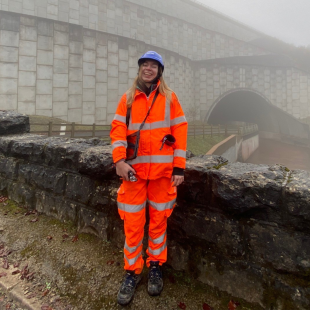MEng (Hons) Civil Engineering, 2021
Why did you choose to study at the University of Edinburgh?
Primarily, Edinburgh is a great place to live. Not only is the city really beautiful, there are events happening all year round and loads of opportunities to explore Scotland. The engineering programme had a broad range of options which was key for me as I didn't want to specialise too early.
Looking back, I also really liked the size of the civil engineering course as we got to know the whole class and our lecturers. Through interdisciplinary group projects, you also still get the chance to work with mechanical and electrical engineers on real-world designs.
What path has your career taken since graduation?
I graduated during the uncertainty of Covid so I was keen to move straight into a career path. I knew I wanted to work in bridges or structures thanks to the summer placements I did during university. I was fortunate to get a job in the bridges team with AECOM in Edinburgh.
What is your current role?
As a Bridge Engineer, I work primarily in the inspection and assessment of existing structures rather than design. I spend approximately four weeks over the year out on bridge inspections, which occasionally involves night-shifts. I help plan the inspections and organise our equipment, take notes on site and write up any urgent defects that the client needs to be aware of.
The rest of my time is spent in the office preparing reports and working on assessment calculations based on the worst-case damage we observed on the structure. I really like the variety of having both site work and office work and it's rewarding to extend the life of structures which are more than 100 years old.
What experiences do you feel helped you get to your current position?
My summer placements and many of the group design projects we did in University were the main points of discussion during my job interview. They allowed me to demonstrate ability to work in a team and overcome challenges.
Additionally, I was awarded the Engineering Leaders Scholarship (ELS) by the Royal Academy of Engineering while at University, which enabled me to participate in further training and study. I would highly recommend applying for the scholarship!
I also had some great support from the University's careers advisor when preparing for my application and interview.
How have you used the skills and/or knowledge developed during your degree in your career?
The technical knowledge from the degree is obviously extremely important and I still refer back to many of my notes even a few years after graduating. I find the whole range of the degree is relevant because you need to have discussions with so many people and it's a lot easier to have some understanding of their specialism, whether that's project management, geotechnical or fire engineering. The skills we gained from group coursework projects have been directly applicable to work, particularly being encouraged to communicate clearly.
Did you do any work experience while you were a student at the University of Edinburgh, and if so how did it help you in determining the field you wanted to pursue professionally?
I did a summer internship. I've always had a pretty clear idea that I want to work on bridges. The summer placements were a good chance for me to confirm that. I do wish I had gained experience with both a consultancy and a contractor so I would recommend that if you're able to!
Summer placements also help you build up a network of contacts. My placement was in a different city and for a different company than I work for now, but I've recently worked on projects with colleagues from my summer placements – civil engineering is a small world. It's nice to join a project call and see a familiar face.
If you could offer some advice to prospective and current students what would it be?
Make the most of everything the University has to offer such as events, courses abroad, societies and work experience opportunities. Your personal tutor and the Careers Service team are able to offer advice if you're ever feeling uncertain about a career path or course, so don't hesitate to set up a meeting.
I would also recommend getting summer placements particularly in your earlier years when you have more time, as they will help you apply and understand your University work.
Lastly, try to get to know as many people as possible whether they're in your class, at an evening event or they're a PhD student running your tutorial. You will keep in touch with many of those people long after your degree.
Found Bethan's story inspiring? Find out more about studying with us.



